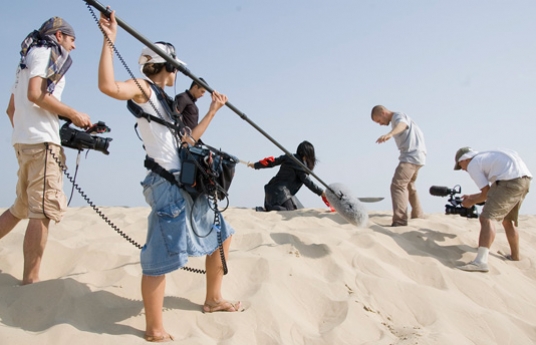صانعو الأفلام العرب يحصلون على تمويل لتقديم أفلامهم إلى العالم
13 مايو 2011 — التمويل

مؤسسة الدوحة للأفلام تحتفل بعامها الأول بتمويل 25 فيلماً جديداً من الشرق الأوسط وشمال إفريقيا؛ وتقدم الدعم المالي للسينمائيين العرب الذين يواجهون تكاليف إنتاج مرتفعة.
كان، 13 مايو 2011: في الوقت الذي ترتفع فيه تكاليف إنتاج الأفلام في الشرق الأوسط وسط تغيرات مجتمعية وسياسية، أعلنت مؤسسة الدوحة للأفلام عن تقديم منح لتمويل 25 فيلماً جديداً في مختلف مراحل الإنتاج، ودعت العالم العربي إلى المزيد من التعاون لتقديم الدعم المالي الجماعي لمساندة رواة القصص من المنطقة.
قدمت هذه المنح لتمويل أفلام في مراحل التطوير والإنتاج وما بعد الإنتاج، وستوفر الدعم المالي اللازم في العالم العربي لإخراج العديد من القصص والأفلام إلى الحياة. في أولى مرحلتين من تقديم المنح، قدمت المؤسسة تمويلاً لخمسة أفلام في مرحلة ما بعد الإنتاج، 12 فيلماً في مرحلة الإنتاج وثمانية منح لابتكار مشاريع أفلام لصانعي أفلام من منطقة الشرق الأوسط وشمال إفريقيا. وقد وزعت المنح لتعكس تنوع الأصوات في هذه المنطقة حيث استفاد منها صانعو أفلام من مصر، الجزائر، لبنان، فلسطين، سوريا، الأردن، تونس والمغرب. وبالتوازي مع التزام المؤسسة باكتشاف ودعم الأصوات والمفاهيم الجديدة، ركزت الكثير من المنح على دعم صانعي الأفلام الذين يعملون على إنتاج أفلامهم الطويلة الأولى.
تتميز الأفلام المختارة بتنوعها وشمولها، حيث تعالج مواضيع رياضية وعائلية تركز على إدراك الذات والحياة، وتحتفل بحرية التعبير في الشرق الأوسط، وتعرض روايات عن الحب والعلاقات العاطفية بالإضافة إلى دراما سياسية حول آثار الحرب الاهلية.
وقالت أماندا بالمر المديرة التنفيذية لمؤسسة الدوحة للأفلام متحدثة عن أسباب ودوافع مبادرات التمويل “لقد عانت منطقة الشرق الأوسط وشمال إفريقياً دائماً للحصول على تمويل من العالم العربي، وهذا العام وجدنا ان التغيير الذي حدث أدّى إلى زيادة في ميزانيات الإنتاج ما جعل الأمر أكثر صعوبة على صانعي الأفلام لينتجوا أفلامهم، ومن المهم جداً أكثر من أي وقت مضى أن تقوم مؤسسات مثل الدوحة للأفلام بدعم صانعي الأفلام وتشجيع الآخرين أيضاَ في العالم العربي على مساندة هذه الصناعة في هذه الأوقات المتقلبة التي تشهد الكثير من التغيرات. ومن المهم الإشارة إلى أن مؤسسة الدوحة للأفلام لا تدعم صانعي الأفلام المحترفين فحسب، بل تقدم في كثير من الحالات الدعم اللازم للمواهب الصاعدة التي تكافح لأن توصل صوتها، وبالتالي سيمكّنهم الدعم المالي من نقل نصوصهم إلى الشاشة”.
من جانبه أوضح سعادة الشيخ جبر بن يوسف آل ثاني عضو مجلس إدارة المهرجان “يعدّ تمويل الأفلام من مؤسسة الدوحة للأفلام خطوة مهمة أخرى لتعزيز مكانة قطر كمقر للسينما والثقافة العالمية. إن نظام دعم من هذا النوع هو امر حيوى جداً لبناء مصداقية دائمة لصناعة السينما المحلية والاقليمية، كما انه يوجه رسالة بأن قطر لا تدعم فقط بناء صناعة محلية لها، بل تعزز الصناعة في المنطقة.
ونحن فخورون بأن نكون مساهمون في تطوير هذه الصناعة الإبداعية التى تعد نقطة انطلاقلصانعى الافلام الاقليمية لابراز ابداعهم للمجتمع الدولى، ونأمل فى اكتشاف النجوم المقبلة فى عالم السينما.
تواصل المؤسسة تمويل الأفلام اعتماداَ على نجاح المبادرات التمويلية والثقافية في العام المنصرم. في 2010، دعمت المؤسسة ستة أفلام من الشرق الأوسط هي “حاوي” (ابراهيم البطوط)، إنسان شريف (جان كلود قدسي)، بدون موبايل (سامح زعبي)، تيتا ألف مرّة (محمود قعبور)، الجبل (غسّان سلهب)، وهلّق لوين؟ (نادين لبكي). بالإضافة إلى ذلك، أعلنت المؤسسة أيضاَ عن الإنتاج الدولي المشترك الأول لفيلم “الذهب الأسود” مع شركة كوينتا للإعلام، وهو فيلم عن ملحمة عربية عائلية بقيمة 55 مليون دولار للمخرج المعروف جان جاك أنّو، من بطولة أنطونيو باندريراس، فريدا بينتو، طاهر رحيم ومارك سترونغ.
وأكدت بالمر على التزام مؤسسة الدوحة للأفلام بدعم صانعي الأفلام من منطقة الشرق الأوسط وشمال إفريقيا ومساندة أعمالهم كرواة قصص عالميين من خلال تقديم منح لـ 25 فيلماً ومشاريع تلفزيونية كل عام. وقالت “إنه وقت رائع أن تكون صانع أفلام من هذه المنطقة، فلدينا صناعة سينمائية تنمو بسرعة على كافة المستويات، ووفق المزج بين مفهوم القديم والشاب لأنهما مهمين في إعادة تشكيل المستقبل، وبدورنا نبقى ملتزمين بتزويد منصة لدعم وترويج الأصوات العربية ورواة القصص من المنطقة”.
إلى جانب تمويل 25 فيلماً، تستقبل مؤسسة الدوحة للأفلام طلبات جديدة لتقديم التمويل للأفلام من 1 إلى 15 يوليو 2011. ستراجع جميع الطلبات من قبل لجنة الاختيار في المؤسسة وسيعلن عن المتقدمين الناجحين في مهرجان الدوحة ترايبكا السينمائي في اكتوبر 2011. أما بالنسبة للدورة الثانية من تقديم الطلبات، فتدعو المؤسسة صانعي الأفلام من منطقة شمال إفريقيا لتقديم مشاريعهم المستقبلية للحصول على التمويل اللازم، وستركز أيضاَ على الاستثمار في مشاريع إقليمية ودولية أكبر ضمن اتفاقيات الإنتاج المشترك.
والمشاريع المرشحة للحصول على تمويل هي الأفلام الطويلة، الأفلام الوثائقية الطويلة، الأفلام الروائية القصيرة، والأفلام الوثائقية والتجريبية، وشددت المؤسسة انه لا يوجد أي قيود أو تحفظات على نوع القصة أو مدتها أو الميزانية الإجمالية للفيلم، مشيرة أنه يمكن توفير التمويل في أي مرحلة من مراحل الإنتاج، ابتداء من الفكرة، الإنتاج او ما بعد الإنتاج ومرحلة الطباعة والتوزيع.
الحاصلون على تمويل:
ما بعد الإنتاج:
الشوق
خالد الحجّار، مصر
روائي طويل
نورمال
مرزاق الواشي، الجزائر
وثائقي طويل
السودان، الأرض، الموسيقى
محمود عمر، مصر
وثائقي قصير
19 فبراير
تمارا ستيبنيان، لبنان
روائي قصير
توق
لينا العبد، سورية
وثائقي طويل
الإنتاج
بيروت هولدم
مايكل كمون، لبنان
روائي طويل
شالط تونس
كوثر بن هانيا، تونس
روائي طويل
الإعتراف
إليان رحاب، لبنان
وثائقي طويل
حنين
أسامة بواردي، فلسطين
روائي قصير
ابن بطوطة
طارق تيجواي، الجزائر
روائي طويل
محمد أنقذ المياه
صفاء فتحي، مصر
روائي طويل
سينما موسكوي
محمد ملص، سوريا
روائي طويل
ملاحظات حول أوديسا تونسية
قيس مجري ومات بيترسون، تونس \ الولايات المتحدة
روائي طويل
إشاعات
عزة الحسن، فلسطين\الأردن
روائي قصير
تيتا
ميرفا فضول، لبنان
روائي قصير
حتى الصباح
هشام بزري، لبنان
روائي طويل
عندما ولدنا
تامر عزت، مصر
روائي طويل
التطوير
إسفلت
علي محمود، لبنان
وثائقي طويل
دونا سيزاريا
ديما الجندي، لبنان
وثائقي طويل
فيفرس
هشام عيوش، المغرب\فرنسا
روائي طويل
اسبوع غزاوي
باسل خليل، فلسطين
روائي طويل
هاوسكيبينج
مازن خالد، لبنان
روائي طويل
نوستالجيا
زياد أبو حمدان، الأردن
روائي طويل
وداعا يا ابي
نيام عيتاني، لبنان
روائي طويل
رأساً على عقب
احمد غصين، لبنان
روائي طويل